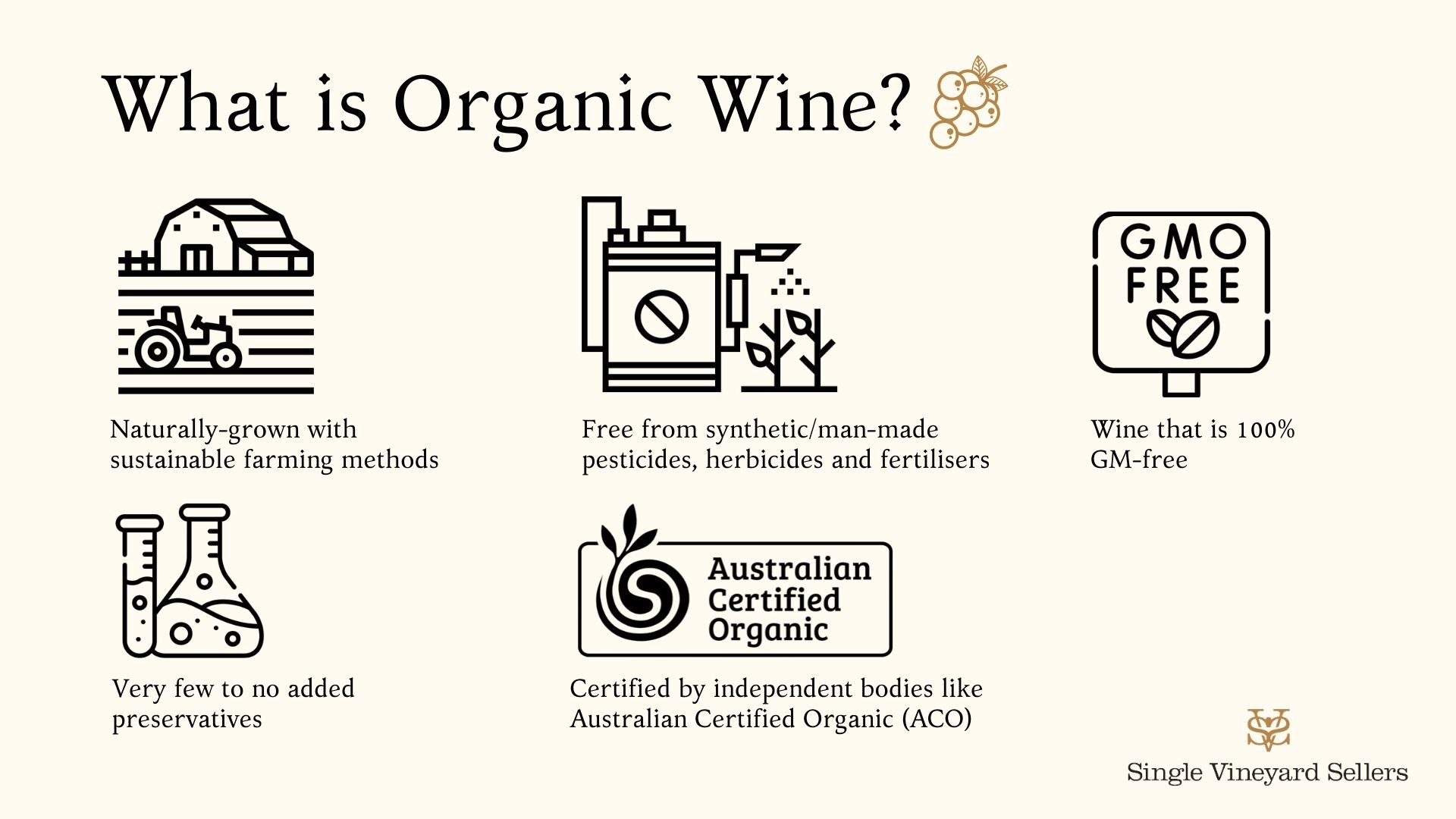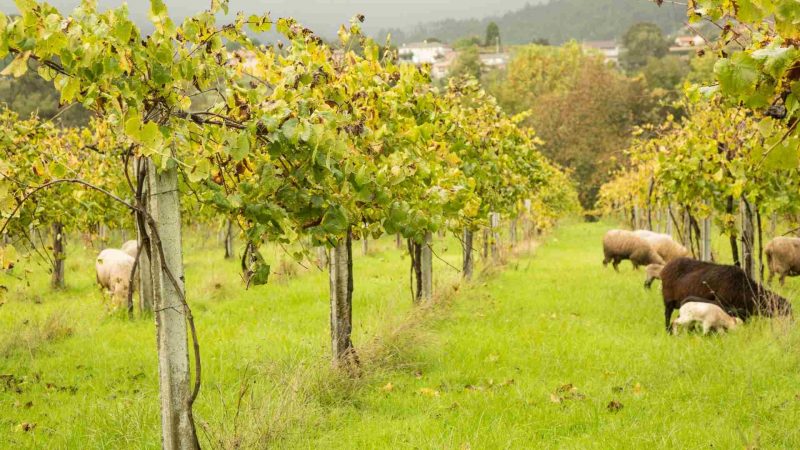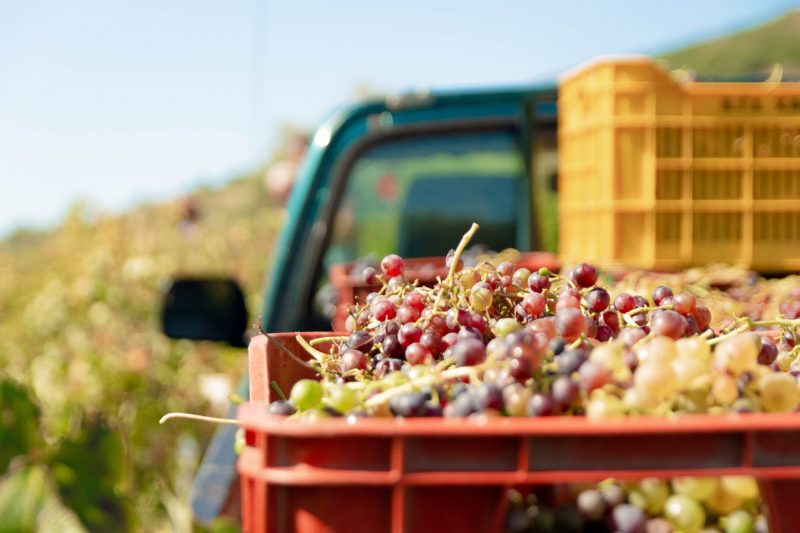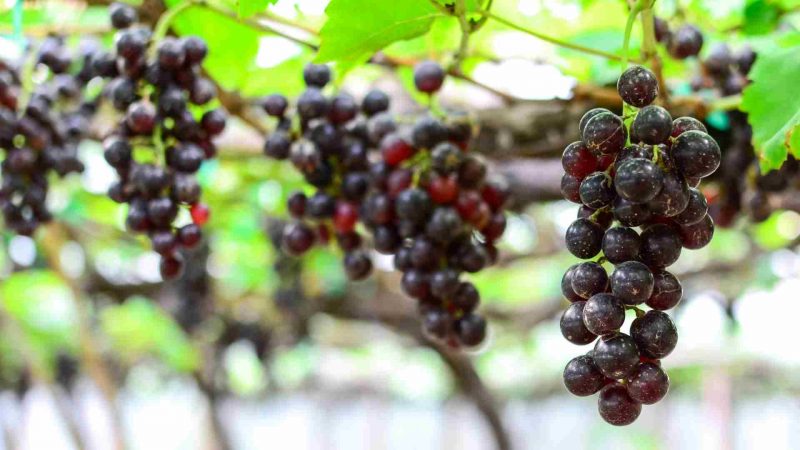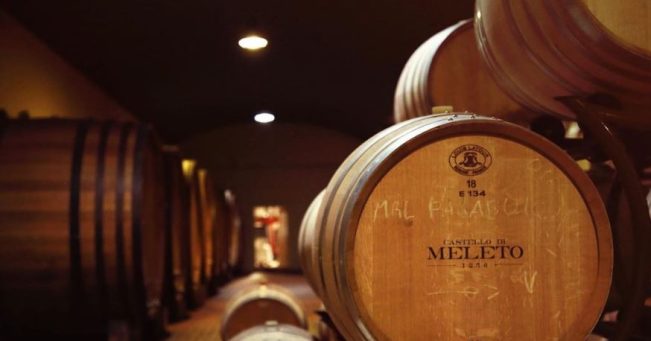Fewer chemicals and additives, gentler on the environment, and often times healthier, no wonder the demand for organic wine is growing in Australia.
But with so many different terms out there, what is the definition of organic wine? And why is this cultivating practice becoming so popular nowadays? Find more about organic wine in Australia with this simple guide!
What is Organic Wine in Australia?
In short, a wine that is made from organically cultivated grapes is what is generally defined as organic wine. This means not adding any synthetic inputs in either of the grape growing or winemaking processes.
These grapes are often cultivated with“organic farming” practices. In Australia, this means excluding the use of artificial chemical fertilizers, pesticides, fungicides, and herbicides.
It’s an environmentally friendly method of grape production that focuses on maintaining a natural equilibrium in the vineyard and surrounding surroundings.
In fact, organic farming is all about organically increasing the health of soils. It’s all about reintroducing organic matter to soils, which serves as a home for moisture and microorganisms, and is what keeps soils and vines healthy.
Is all organically made wine certified organic?
The interesting point is, not all organically produced wines are certified organic. The entire winemaking process, from planting the vines to bottling the wine, must be certified organic. Certification takes years and requires a great deal of effort, as well as yearly audits.
How do you make organic wine?
Instead of using chemical pesticides, organic producers use natural repellents and pest management techniques such as so-called “cover crops,” which attract beneficial insects that repel the pests that harm vines. Sheep, for example, are frequently used by growers to graze between the vine rows and decrease weeds.
The ultimate goal is for the vineyard to become a self-regulating ecosystem, with the use of artificial agents in wine production being completely eliminated.
This ‘minimal intervention’ method starts with the vines and continues through the winemaking process. In this process, preservatives like sulfites are used in lower amounts to produce a wine that is as close to what nature intended as possible.
Does this mean then that organic wine is healthier than non-organic wine?
The short answer is yes, but how healthy is the wine will depend at the end on each producer.
Generally, organic wine grapes are healthier than the ones cultivated traditionally. Organic farming results in grapes with thicker skins and higher concentrations of all those beneficial anthocyanins and antioxidants, such as polyphenols and cardio-friendly resveratrol.
Organic wines are also free of residual traces of vineyard additions such as pesticides and herbicides loaded with chemicals.
They also don’t contain possibly hazardous cellar additives like flavouring agents or caramel colouring.
Organic wine is preservative-free?
Organic wines can contain preservatives under Australian law, but the amount is limited to around half of what is allowed in conventional wines.
Sulphur dioxide (sometimes known as ‘preservative 220′) is the most common preservative. This preservative is produced naturally during fermentation but supplemented by some winemakers to maintain wine quality.
Is Organic Wine Better for the Environment?
This is another plus for the enthusiasts of “organic wine.” Transitioning to organic farming practices has genuine, tangible, and long-term benefits for both the environment and the farmers.
Organic vines, in particular, require less water since their soils are built up with compost and contain more organic matter, which holds water much better. This type of soil in fact is more resistant to droughts and temperature extremes.
Organic wineries safeguard local ecosystems and preserve their surrounding flora and animals by limiting the harm they cause to the environment.
Vineyard employees are doing their share to leave the soil as healthy, if not healthier than they found it. They achieve that by using less water and avoiding contaminating the current water supply with herbicides.
Organic wine in Australia
Organic and biodynamic wines are a small but rising sector in Australia, with exports increasing by more than 50% from 2016 to 2019.
People are becoming more interested in where their food comes from, and they are also becoming more interested in how their wines are produced.
Is Organic wine Natural wine?
Natural wine is an unofficial word that refers to wine prepared with minimal intervention and few or no additives using conventional methods. Although many of these wines are organic, not all of them are.
Is organic wine Vegan?
Not all organic wine is vegan. Fining agents, which can be manufactured from milk protein, egg whites, gelatine, or fish, are often used by winemakers to refine and stabilise their wines (but only trace amounts remain in the final product).
Vegan wines are either not fined or contain earth-based additives like bentonite clay.
What are Biodynamic wines?
Biodynamic wines are based on organic principles and are inspired by the work of Rudolf Steiner, a late-nineteenth-century spiritual thinker.
Growers and winemakers avoid pesticides and chemical fertilisers, and view the vineyard as an integrated and holistic system, similar to organic wines.
They will also use astrologically-informed planting, pruning, and harvesting schedules, as well as biodynamic soil ‘supplements.
How can you tell if a wine is Organic in Australia?
A wine producer that wants to label their products organic in Australia must have accreditation from one of Australia’s several organic certifying organisations, such as Australian Certified Organic (ACO).
This is needed in order to make any organic claims in the marketplace, including labeling their wines as “organic,” “biological,” “ecological,” or any other word to that effect.
Also, The National Association of Sustainable Agriculture (NASAA) offers organic certification, in addition to the Australian Certified Organic (ACO) program.
If you see either logo on the bottle, you can rest assured that the wine you’re considering drinking has met the organic certification requirements.
Is also worth mentioning that every country has its own bodies responsible for certifying wines as organic.
Shop for Organic Products
Or view our full catalog of organic products through this link.

